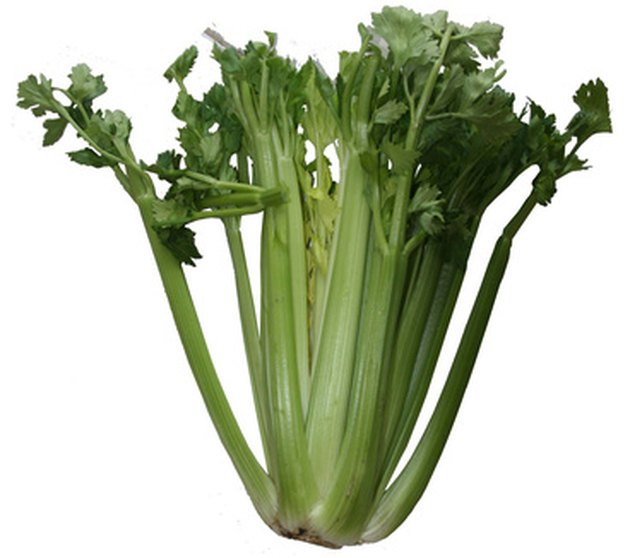What are the differences between celery and celery seeds?



Celery Seed Extract Side Effects
Although celery has been used as an herbal remedy for thousands of years, it is not well-known for its medicinal purposes in the Western world. In the past, celery was used to treat a host of ailments, including the flu, liver disease, water retention and arthritis. Today, it is mainly used as a diuretic and to treat gout. Celery seed supplements are classified as a food by the FDA and therefore not tested for safety and efficacy. Ask your doctor first before taking celery seed as there are some side effects.

(Image: olgakr/iStock/Getty Images)
Celery Seed
The celery we know today originally grew wild in the Mediterranean region. Its scientific name is Apium graveolens, and it is related to fennel, carrots and parsley.The plant grows as a stalk to a height of two to three feet, and the seed is harvested from the flowers. The tiny seeds are tan to dark brown in color and have a spicy taste and strong aroma. Celery seed contains a number of biologically important substances, including flavonoids high in antioxidants, volatile oils, coumarin with anti-coagulating effects, the omega-6 fatty acid linoleic acid and the powerful healing compound 3nB, or 3-n-butylphthlalide.
Uses
Celery seed is available as fresh or dried seeds and as a supplement in tablets, capsules, oil and an extract. There is a dearth of studies, so more research is needed. Natural Factors reports the evidence is promising regarding celery seeds' use in lowering blood pressure. It is also being used as an alternative treatment for gout, fibromyalgia, painful gas and bloating, rheumatic arthritis and as a diuretic to combat fluid retention. Celery seed oil has some sedative effects and is used for anxiety and nervousness. It may prove to be beneficial in lowering cholesterol and acting to protect the liver from damage.
Side Effects
Although celery seed has not been well-studied as yet, there are several known side effects, including sensitivity to sunlight and skin rash. Taking large doses of celery seed can cause depression, fatigue and slow heartbeat. It is possible to have an allergic reaction to celery seed. If you are allergic to birch pollen, be careful about taking celery seed. Allergy symptoms include itching, hives, tightness in the chest, difficulty breathing and swelling of the lips and throat. Report any signs of an allergic reaction to your medical provider immediately.
Precautions
Never take celery seeds from commercially sold garden packages; those seeds are treated with harmful chemicals. Do not take celery seed if you are pregnant, as it can stimulate contractions and bleeding in the uterus. If you have kidney disease, you may not be able to take celery seed. If you take blood-thinner medication, diuretics, tranquilizers, sedatives or thyroid medication, do not take celery seed unless advised to by your doctor. Celery seed can interact with other herbal supplements, including angelica, horse chestnut, garlic, turmeric, ginger, goldenseal, lemon balm, St. John's wort and valerian. Be sure to discuss all your medications and supplements with your physician before taking celery seed.
Celery Juice & Headaches
Pain or discomfort in the head or scalp is a common condition that is often related to stress, anxiety, injury or depression. Certain infections, lack of sleep or food, alcohol, street drugs, and overworking are some of the other common factors that may lead to headaches. In fact, headaches can be classified into several types, such as cluster headaches, sinus headaches, migraines and tension headaches, based on their frequency, area, severity and cause. Over-the-counter pain medications may help manage the condition along with natural herbs and supplements such as celery.

Celery and Its Supplements
Celery, or Apium graveolens, is a slender, tall plant with segmented leaves and small, white flowers. Small, brown and tan seeds, found in the flowers of the plant, contain volatile oils, flavonoids and other chemical compounds that are responsible for its biological activity. Celery products are available as fresh or dried seeds, tablets, capsules, seed oils, juice and extracts, and have been used in Oriental medicine to treat a variety of conditions including gout and rheumatoid arthritis.
Link between Celery and Headache
Tinctures prepared from celery seeds can help relieve headaches that last all day and increase when eating and in open air, according to Dr. Timothy Field Allen, author of the book "Handbook of Materia Medica and Homeopathic Therapeutics." The author also recommends celery seed tinctures to treat sharp headaches over the eye and temple area that last all night, and for throbbing aches in the temple. Paul Pitchford, in his book "Healing with Whole Foods," recommends celery juice combined with lemon juice to treat headaches caused by high blood pressure and excessive heat. Celery can also help relieve throbbing headaches, sunken eyeball feeling and lack of sleep due to thinking, which may aggravate the headache, says Dr. William Boericke in the book "Pocket Manual of Homeopathic Materia Medica."
Side Effects
Celery products are safe to use in the general population, although allergic reactions including rash and shortness of breath may sometimes occur. However, the University of Maryland Medical Center warns pregnant women against the use of these supplements as they may lead to uterine bleeding, contractions and miscarriage. The herb should also be avoided by individuals with kidney inflammation. Celery may also interfere with certain blood-thinning and diuretic medications.
Precautions
Always talk to a doctor before using celery products to determine if they are right for you. Never take celery seeds from the garden packet as they are treated with harmful chemicals. Also, the production of herbal supplements in the U.S. is not regulated by the Food and Drug Administration. Ensure the safety and purity of the product before taking.
REFERENCES & RESOURCES
- "Handbook of Materia Medica and Homoeopathic Therapeutics"; Timothy Field Allen; 2005
- "Healing with whole foods: Asian Traditions and Modern Nutrition"; Paul Pitchford; 2003
- "Pocket Manual of Homoeopathic Materia Medica: Comprising the Characteristic and Guiding Symptoms of All Remedies (Clinical and Pathogenetic); William Boericke; 1996
- University of Maryland Medical Center:Celery Seed
Adverse Effects of Celery
Celery -- scientific name Apium graveolens -- is a plant whose crisp green stalks are eaten both raw and cooked. Native to the Mediterranean region, it's been cultivated since ancient Greek times. Celery is a common component of weight-loss diets, as it's low in calories and high in nutrients. Celery seed is also sometimes used as an herbal remedy. There are some health concerns regarding celery, however, that you should be aware of.

Allergic Reactions
Celery is a very common allergen and reactions to it can be life-threatening. If you're allergic to birch pollen or mugwort, you're also likely to react to celery. Symptoms can include itching and rashes, swelling of the face, mouth, tongue and throat, dizziness and stomach upset. A more severe reaction called anaphylactic shock is marked by lightheadedness, a drop in blood pressure, rapid pulse and difficulty breathing. Anaphylactic shock is a serious medical condition that can lead to coma and death. Cooking does not affect the allergenic potential of celery.
Photosensitivity
Celery contains several compounds known as furanocoumarins. These chemicals cause skin to be photosensitive -- that is, sensitive to bright light, especially sunlight. Usually this reaction happens due to intensive handling; it's common among agricultural workers, for example. However, Dermanet New Zealand reports that "occasionally, ingestion of these chemicals in celery soup can cause generalized sun sensitivity; several people have developed severe sunburn after eating celery soup and then going out in the sun or to a tanning salon."
Kidney Issues
Celery is both rich in water and a natural diuretic. Therefore people with kidney problems should monitor their celery intake, as excessive consumption might put extra strain on their kidneys. Consult with a doctor if this is a concern of yours.
Concerns for Pregnant Women
Pregnant women should avoid large doses of celery and celery seed as it can induce bleeding and uterine contractions. Occasional consumption as part of a well-balanced diet is not an issue.
LINK:
nice article.. https://www.purchasetramadol.com
ReplyDelete